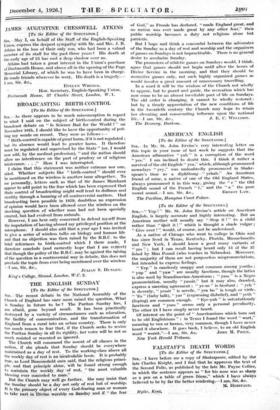[To the Editor of the SPECTATOR.] Sria,—" Yep ! "
Mr. St. John Ervine's article on American English, is largely accurate and :highly interesting. But an American mother will usually say " Stop it ! " to a child rather than " Quit it 1" which is thought a shade vulgar ; " Give over ! ", would, of course, not be understood.
. As a native of , Chicago . who went to college in Ohio and has since lived in Texas, Kentucky, Florida, Massachusetts and New . York, I. should know a good many variants of " yes " ; but I can recall having heard only 13 of. the 37 listed by Miss Pound (who teaches in Nebraska). Moreover, the majority ,of them are not purposeless mispronunciations, but intended to express. feelings.
" Yep " is carelessly snappy and common among youths ; " yup " and ." yaw " are usually facetious, though the latter is also used by Scandinavian-Americans ; " yass " is a Negro pronunciation, usually " yassir," but it may also, drawled, express a sneering agreement ; " ye-us " is hesitant ; " yeh " is slovenly, " yessir " is servile, " yea bo " is tough or virile. "'Es " (baby talk), " yar " (expressing disbelief), and " yeth " (lisping) ,are common enough. " Eye-yah " is ostentatiously facetious and " yum " seems only a personal peculiarity. The other 24 I have simply never heard. Of interest on the point of " Americanisms which turn out to be old Englishisms " : in Texas I found the word " wart," meaning to vex or harass, very common, though I have never . heard it elsewhere. It goes back, I believe, to an old English
word " worrit."—I am, Sir, &c.. JoHN M. -PRICE. New York Herald Tribune.






























































 Previous page
Previous page